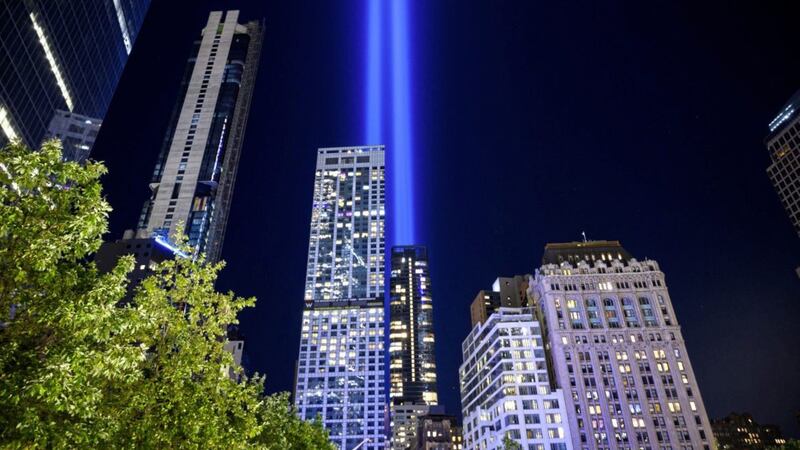LIKE most people, I can clearly recall where I was when first informed of the 9/11 attacks.
I was a young teacher only a few years into the vocation, working in a Belfast primary school. A fellow teacher charged into my classroom to break the news, and after leaving the children out at home time I joined staff huddled around a television set.
For what seemed like an eternity, we stood there, with hardly a word spoken, watching in disbelief as the buildings collapsed, horrified by the thought of lives extinguished beneath the mass of rubble and thick waves of smoke and ashes that filled the streets of that most indomitable of cities.
The two decades that have passed by since have not dimmed the memory of a horrific event which will remain forever etched in minds.
There are many stories and images that we associate with the day, courtesy of the television footage and eyewitness accounts that have featured in broadcast reports, documentaries, books and countless feature articles, but the enduring thought that has always stayed with me is of the firefighters and other first responders bravely charging towards the danger and ultimately death as others fled away from the terror.
The story of Fr Mychal Judge reminds us of how New York has always been a special home to the Irish, our 33rd county.
The photograph of the by-then-deceased New York City Fire Department chaplain being carried away from the wreckage is amongst the most poignant images of the atrocity.
The Franciscan priest, a son of County Leitrim immigrants, had rushed to the Twin Towers upon hearing of the devastating attack to be with the firefighters and provide support and comfort.
In my home town of Phoenix, Arizona, the name of Pat Tillman is still revered.
A celebrated member of the professional American football team located in the city, the Arizona Cardinals, Tillman turned down a multi-million dollar contract to enlist with his brother in the US Army after the 9/11 attacks.
He was killed in a friendly fire incident in Afghanistan in 2004 that the military authorities initially attempted to portray as an enemy attack.
Tillman had served in both Iraq and Afghanistan but had become disillusioned with America’s wars and had tried to arrange a meeting with Naom Chomsky, the fierce critic of US government foreign policy, prior to his death.
America was more than justified in seeking the destruction of al-Qaeda after the attacks, but extending their ambition to seeking regime change in Afghanistan and Iraq as part of a dubious and barely credible ‘war on terror’ was always destined to end in disaster and to indict the politicians on both sides of the Atlantic who pursued a calamitous and catastrophic course of action that has plunged a region further into turmoil and instability than was even the case prior to 9/11.
The ‘shock and awe’ strategy in the end did not prevent the superpower nation from being dragged into its longest ever conflict, one in which it would ultimately concede defeat.
There are many legacies to the fatal attacks launched on that day two decades ago.
The Patriot Act triggered a debate which continues to this day, pitting civil liberties against national security.
The Bush administration also set up the Department of Homeland Security, now employing almost a quarter of a million people to protect the nation, an ever-changing brief in a time when domestic terror from right-wing white people poses a greater threat to the nation’s stability than Islamic fundamentalists.
Ironically, fear that the 9/11 attacks would be just the start of a lengthy domestic terror campaign proved unfounded.
Then FBI Director Robert Mueller had in 2003 warned that the greatest threat to the USA was from al-Qaeda cells within the country sustained by its Muslim population. This proved to be a wholly inaccurate assessment, failing to recognize that the overwhelming majority of US Muslims were well assimilated within American culture and society - more so than their European counterparts, evidenced by the dreadful murderous violence visited upon several western European cities.
Approximately 7,000 American soldiers were killed in the two Middle East wars waged by America and her allies after the New York and Pentagon attacks.
But the death toll in both Afghanistan and Iraq registers in the hundreds of thousands, with generations condemned to living in communities ravaged by conflict and poverty as a consequence.
The memory of the thousands killed on September 11 has not been honoured by the conflicts waged in their names.








